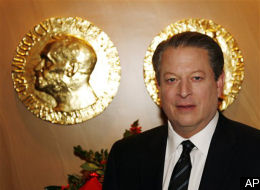I like this picture, lol
OSLO, Norway -- Al Gore received his Nobel Peace Prize on Monday and urged the United States and China to make the boldest moves on climate change or "stand accountable before history for their failure to act."
In accepting the prize he shared with the U.N. climate panel, the former vice president said humanity risks sliding down a path of "mutually assured destruction."
"It is time to make peace with the planet," Gore said in his acceptance speech that quoted Churchill, Gandhi and the Bible. "We must quickly mobilize our civilization with the urgency and resolve that has previously been seen only when nations mobilized for war."
Gore shared the Nobel with the Intergovernmental Panel on Climate Change for sounding the alarm over global warming and spreading awareness on how to counteract it. The U.N. panel was represented at the ceremony by its leader, Rajendra Pachauri.
"We, the human species, are confronting a planetary emergency - a threat to the survival of our civilization that is gathering ominous and destructive potential even as we gather here," Gore said at the gala ceremony in Oslo's city hall, in front of Norway's royalty, leaders and invited guests.
Gore urged China and the U.S. - the world's biggest carbon emitters - to "make the boldest moves, or stand accountable before history for their failure to act."
His remarks came as governments met in Bali, Indonesia, to start work on a new international treaty to reduce climate-damaging carbon dioxide emissions. Gore and Pachauri plan to fly there Wednesday to join the climate talks.
The governments hope to have the new pact, which succeeds the Kyoto accord, in place by 2012, but Gore has said the urgency of the problem means they should aim to come to an agreement by 2010.
Before his speech, Gore said in an interview with The Associated Press that he believes the next U.S. president will shift the country's course on climate change and engage in global efforts to reduce carbon emissions.
"The new president, whichever party wins the election, is likely to have to change the position on this climate crisis," Gore said in the interview. "I do believe the U.S., soon, is to have a more constructive role."
He said it was not too late for Bush administration to join efforts to draft a new global treaty limiting greenhouse gas emissions.
"I have urged President Bush and his administration to be part of the world community's effort to solve this crisis," Gore said. "I hope they will change their position."
The Bush administration opposed the Kyoto treaty on climate change, saying it would hurt the U.S. economy and objecting that fast developing nations like China and India were not required to reduce emissions.
 You could make a similar argument for Bill Clinton. As President, you're often handicapped, and at the mercy of Congress and partisan squabbling.
You could make a similar argument for Bill Clinton. As President, you're often handicapped, and at the mercy of Congress and partisan squabbling. 

